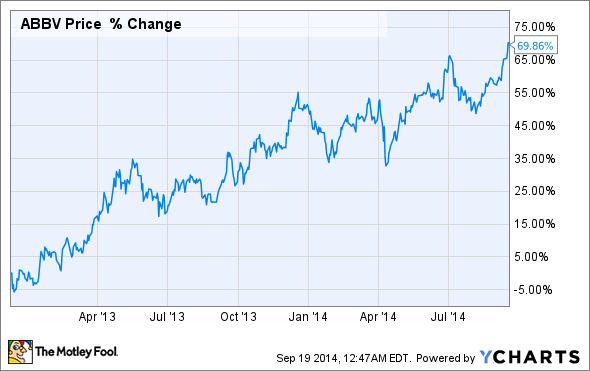Dividend stocks are a powerful force within a well-balanced portfolio because they can dramatically increase the rate of compounding interest through dividend reinvestment plans.
Not all dividend stocks are great investment vehicles, however. For example, some companies don't increase their total dividends payouts on a regular basis, don't offer attractive yields at current levels, or simply have weak prospects for growth going forward. Companies that offer a compelling mixture of high yields and strong growth prospects have perhaps become harder to find in this aging bull market, but they do exist.
With this in mind, I think AbbVie (ABBV 1.06%) is a healthcare stock that income and growth investors alike should get to know better. Ever since the company was spun-off as the pharmaceutical segment of Abbott Laboratories (ABT 1.91%) in 2013, AbbVie's share price has marched steadily upward, shown by the chart below.
And even though its share price has shot up over the past year, this stock still offers a relatively high dividend yield of 2.83% at current levels, compared to the sector average of 2.69%.
AbbVie's past performance and even its attractive yield are not the reasons why I find this stock so compelling, however. Going forward, the company has some big plans in the works that could unlock a tremendous amount of value for investors over the long term. So, let's take a deeper look at this top dividend stock.
AbbVie is set to diversify its product portfolio in a big way
AbbVie has a problem, albeit a good one in some respects. The company has been reliant on one drug, Humira, for more than half of its top-line growth in recent quarters. That said, Humira's commercial performance has been nothing short of amazing, posting a 26% increase in sales to $3.29 billion in the second quarter of this year compared to a year ago.
The patent cliff has perhaps taught all healthcare investors that over-reliance on any single product for growth can be a major pitfall. AbbVie has thus developed a potent triple-combo therapy indicated for hepatitis C genotype 1 patients that is expected to be approved shortly and launched commercially within the U.S. before year's end. The commercial upside for the drug is up in the air nonetheless, given that it will be competing against Gilead Sciences (GILD 0.91%) and Johnson & Johnson's (JNJ 1.49%) hepatitis C offerings.
While the Street is expecting first year sales to come in anywhere from from $2 to $3 billion for AbbVie's triple-therapy, I think these estimates are speculative at best. After all, the Street wasn't even close to predicting the sales of either Gilead or J&J's new drugs before they were launched. That having been said, I think it is safe to say that AbbVie's hep-C drug clearly has blockbuster potential and will therefore be an important source of top-line growth down the line.
AbbVie's recent acquisition of Shire (NASDAQ: SHPG) has also helped to further diversify its product portfolio. This acquisition gives AbbVie several drugs like Vyvanse, Replagal, Firazyr, and Cinryze that all posted double digit sales growth in the second-quarter, boosting Shire's top line by 20% compared to a year ago. All told, the newly merged entity is expected to easily generate over $25 billion in revenue next year.
Don't forget the tax inversion!
Although Shire has impressive product and clinical portfolios in its own right, the main reason AbbVie was interested in acquiring the Dublin-based company was to lower its effective tax rate. AbbVie's effective tax rate for 2013 was 22.6%, whereas Shire's was only 16.4%. Experts believe that the synergies created by this merger could lower the new entity's effective tax rate to a mere 13%. If this line holds going forward, we can expect AbbVie to save over $2 billion per year on taxes and this number will only increase as revenues climb.
Foolish wrap-up
One of the clear lessons the tax inversion of Actavis plc (AGN) should teach healthcare investors is that these companies won't be shy about spending their tax savings on new acquisitions to fuel growth. Actavis has been on a spending spree since moving abroad, resulting in a massive 34% increase in total sales year-over year. AbbVie appears to already be following in Actavis' footsteps with its recent deal with Infinity Pharmaceuticals (INFI) for its blood cancer drug duvelisib. So, you shouldn't be surprised if this trend continues.
From a dividend perspective, these new revenue sources will only increase free cash flows over the long term and should ultimately result in higher total dividend payouts. As such, I think AbbVie should be considered for both its sector-beating dividend yield and strong growth prospects.





